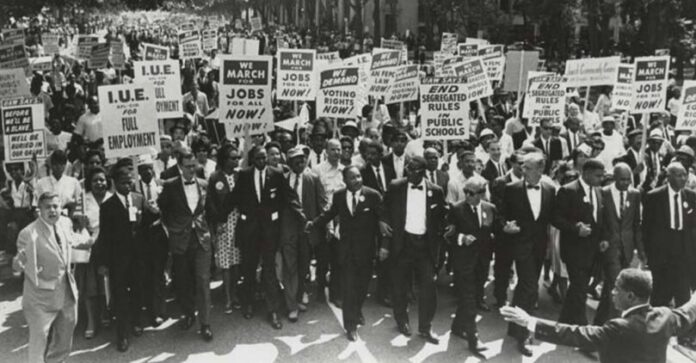
By Barrington M. Salmon, NNPA Newswire Contributor
Before Dr. Martin Luther King, Jr. was assassinated in Memphis, TN, on April 4, 1968, he was orchestrating a profound shift in the Civil Rights Movement. After achieving significant victories on the political front with the landmark Civil Rights Act of 1964 and the Voting Rights Act of 1965, King and the Civil Rights Movement focused their attention on another insidious issue confronting the Black community – economic inequality.
In the 60th year following the “March on Washington for Jobs and Freedom,” speakers, cheered on by thousands, lined up during an anniversary commemoration on August 26, 2023 and called for a resurgence and continuation of King’s aborted call for economic justice. The striking commentary came from civil rights and economic justice advocates alike.
https://vimeo.com/861476351/e4dcd1cb3d?share=copy
“Dr. King knew that economic rights were key to true equality,” said Robert F. Smith, Founder, Chairman and CEO of Vista Equity Partners, LLC and a highly successful investor with intimate knowledge of the economic and financial systems in the U.S.
Standing where King stood in front of the Lincoln Memorial 60 years ago, Smith said, “His moral calls for economic justice are what I want to talk to you about today. Because as we stand here, the war on diversity and inclusion threatens all of the progress made through the sacrifices of our ancestors.”
Well-known and applauded for his having paid the student loan balances of the 2019 graduating class of Morehouse College, Smith told the crowd that the war against economic injustice is not nearly over.
“Yes, there are Black millionaires and a few Black billionaires, but our economy is still structured to keep profits and power out of the hands of Black folks,” Smith said, pointing out that the average white family has wealth that is 12 times greater than the average Black family.”
According to data from Synchrony Bank, the medium net worth of a Black family is $24,100 verses $188,200 for a White family.
Smith concluded, “As we honor the legacy of Dr. King, we must expand our focus to include economic justice.” He called on Americans of all colors to invest in the Black community.
Smith’s speech preceded Martin Luther King III, who asked the thousands, “What are we going to do?” King concluded, “We need all of us to be engaged.”
Like Smith and King, the Rev. Al Sharpton concluded the rally portion of the day before the march by calling for racial unity behind the cause of economic justice. Reflecting on attacks on affirmative action and against businesses and corporations with racial diversity programs, Sharpton announced that he would lead “a fall of economic sanctions against those who bow to this.”
Sharpton concluded, “If you think you can take money out of our homes and communities, we are not going to allow that to happen.”
While the Great Migration saw approximately six million Black Americans move out of the South into the urban metropolises of the North, Midwest, and West in search of a better life, the economic opportunities many of them hoped for did not materialize.
King knew this all too well, using a 1966 essay for the Nation to paint a portrait of the sprawling urban slums from The Bronx, New York, NY, to the Watts in Los Angeles, CA, and argued that the attainment of political rights does not end the battle for civil rights.
“The future is more complex,” wrote King. “Slums with hundreds of thousands of living units are not eradicated as easily as lunch counters or buses are integrated. Jobs are harder to create than voting rolls.”
Dr. King’s call for economic justice on the eve of his assassination – when he too called for economic sanctions against opponents of equality – remains unfulfilled. But, decades later in sweltering heat on the National Mall, King’s last vision was echoed by a growing chorus of leaders.
“We must defeat poverty,” said National Urban League President Marc Morial before Sharpton lead thousands in a march to the King Memorial. “We call for a national living wage, for the passage of the child tax credit, for an end to gentrification, to redlining, and we will continue to work and fight until hell freezes over. Then we will fight on the ice!”


